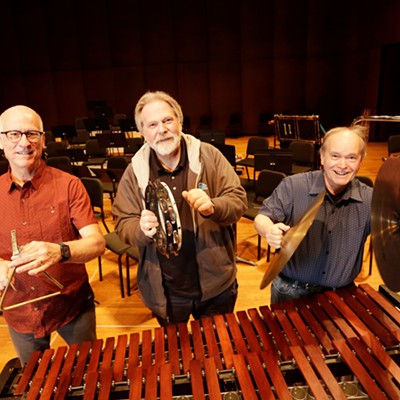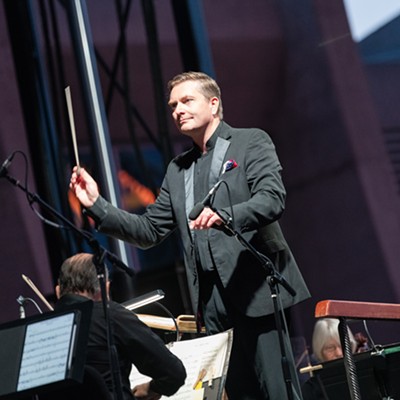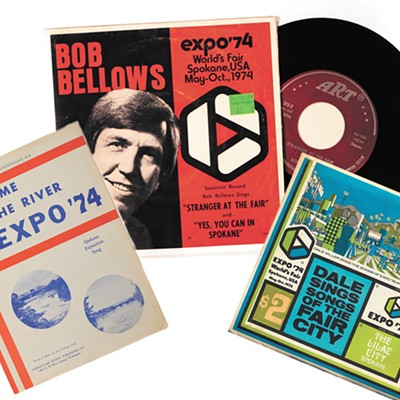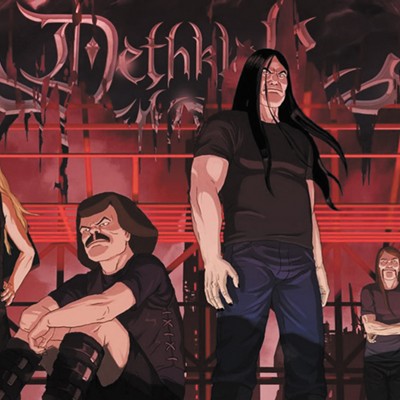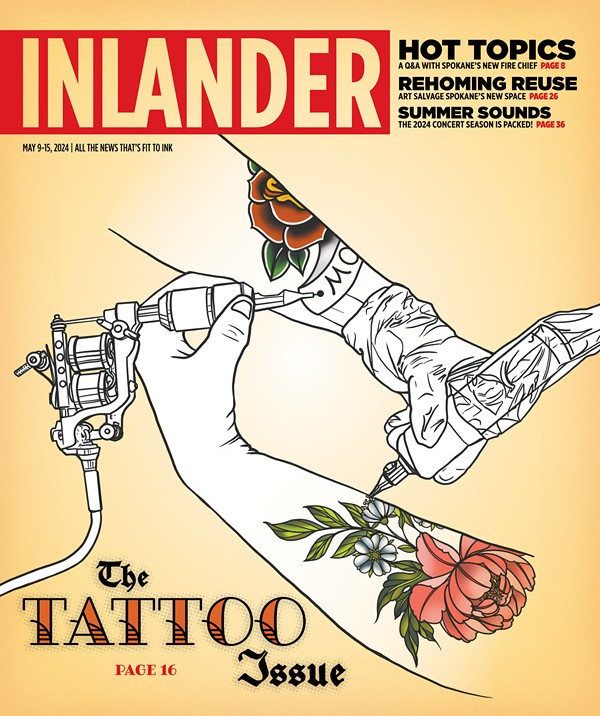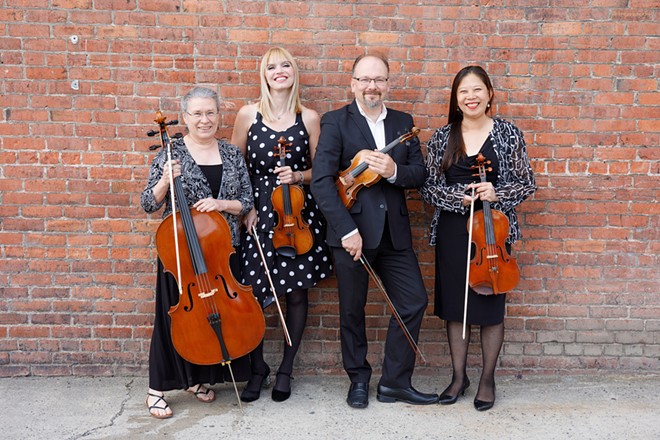
While there's always an impressive power hearing a full symphony fill a room with sound, there's a stirring subtlety that can only be achieved via classic music on a smaller scale. That's a sonic itch that the Spokane String Quartet is always happy to scratch.
Before the Spokane String Quartet takes the stage at The Fox this Sunday for a program featuring special guest pianist Archie Chen, we caught up with violinist Amanda Howard-Phillips—who has played with the quartet since 2011 and is also second violin in the Spokane Symphony — to chat about the communal expression of string quartet music, SSQ's upcoming shows, and the unique place the group occupies in Spokane.
It's a really, really cool program. We're playing Beethoven's "Opus 18, Number 4" which is just a wonderful, exciting piece.
Of course, we're playing the Dvorak piano quintet with Archie, who is a wonderful treasure to have in Spokane, such a such a fantastic pianist. And the Dvorak is just a monument of the repertoire. It's four movements of exciting, accessible music. You'll go home singing themes that will get stuck in your head, because it's so melodic and vibrant and so much fun.
And then, lastly on the program is a quartet by Canadian composer Vivian Fung, who I'm a big fan of. I discovered her music because we played a movement of this piece for string orchestra in the Symphony a few years back with our resident conductor, Morihiko Nakahara. She's a living composer, and I'm always excited to bring new music by living composers to the Spokane String Quartet: fresh voices, especially women composers, people of color. It's so exciting, and I think that it's fantastic music.
Is there anything specific you're looking forward to playing during the rest of Spokane String Quartet's season?
I'm really excited about our February program. We're doing a program for Black History Month, and we're playing all music by Black composers, which is something the Quartet has never done before. I'm really, really excited. We're paying a piece by George Walker. Again, we played a movement from that quartet in the Symphony. We're playing a quartet by Samuel Coleridge-Taylor.
And then filling out that program is quartet by Daniel Roumain, who is a living American composer, and it's called "Rosa Parks. " It's a really cool piece. There's a one movement where we get to stomp our feet, and it's a lot of fun. It's moving. It's beautiful. It's accessible. Again, I think it'll be a real thrill for Spokane audiences, and a thrill for us to play.
As a classical musician, what invigorates you about performing in a string quartet as opposed to a symphonic or solo performance situation?
My greatest joy as a musician is playing with other people. The joy in creating music for me really happens when I'm sharing that with other musicians, it's a collective joy when we create something together. And chamber music was really my first love.
I feel like it can be so much more visceral than playing in a symphony. It's almost like you're looking at a painting: a symphony might be more photorealistic, with the brushstrokes kind of blended in and the evidence of the human hand might be just a little bit smoothed out. But chamber music is so much more visceral: you can see the brushstrokes, you can hear the breathing, you can hear the attack on the strings. We're moving together, we're all communicating, we're all sharing in the creating experience equally. I think it's so thrilling and so intimate.
Not saying that I don't love playing in a symphony, either, because of course I do. The power and the excitement.
But one of my music history professors said that, in his opinion, this string quartet was the the most perfect vehicle in existence for human expression. And I tend to agree.
There's a reason why why Beethoven poured his heart out into his quartets more than any other music that he wrote. And so many other composers just wrote their most personal, their most intimate, their most thrilling music for the string quartet. And it's such a joy to be able to be part of it.
How has Spokane and the community impacted your musical approach?
Well, I think to be able to do what we do in the Spokane String Quartet is pretty rare, especially for a city of our size. Because we are our own separate, tiny nonprofit.
Although we're all members of the Spokane Symphony, the quartet is a completely separate organization. We don't fall under the umbrella of a university or anything like that. So we have complete creative control. We program our own concerts and set our own schedule, which is really, really cool. And I think it's pretty unusual.
I feel like our audiences in Spokane, both for the Symphony and for the Quartet, are really enthusiastic and they're also really adventurous. It's always amazing to me how, we'll play the classics — Beethoven and Mozart and Haydn and Mendelssohn and all that stuff — but we also program stuff that's a little bit more challenging, and it's really, really so gratifying to see the audience respond to that. I'm so grateful that our audience is open-minded and excited to try new things and really kind of enjoy going on those adventures with us.
Outside of Spokane String Quartet and the Spokane Symphony, what else is keeping you musically busy these days?
This year I am filling in as lecturer of violin and viola at Eastern Washington University. The violin professor there, Julia Salerno, took a year leave. And so I've taken over her responsibilities. And it is such a thrill to be able to work with the students there, such talented, hard-working young musicians. Many of them are pursuing music education as a career, so to work with the next generation is an honor.
Is there anything else you'd like to add?
COVID has been really, really hard. One of the hardest thing for me, like I said, is that playing music for me is a collective effort. It's not nearly as much fun if it's just me. It's creating music with people and creating music for people. And to be able to be on stage again and share our hard work and our triumphs and our challenges with our amazing audiences here is just the best thing ever. So we're so grateful to be back.




